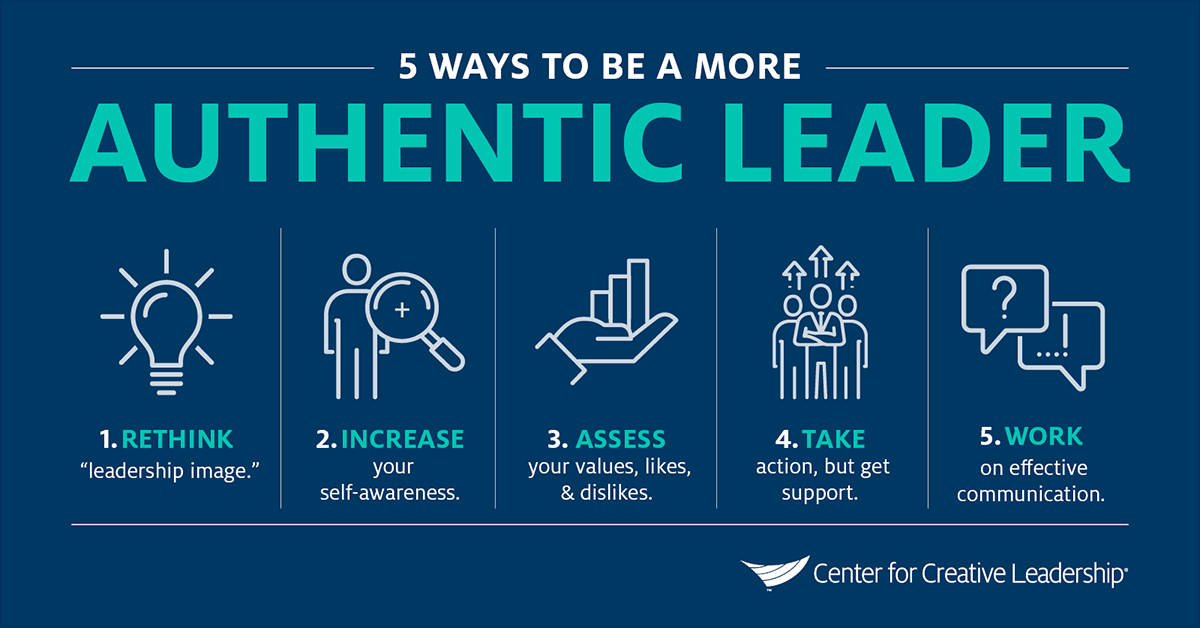Leadership success starts with authenticity — doing our jobs without compromising our values and personality. People trust us when we are true to ourselves, and that trust makes it possible to get things done.
Leaders who are clear about the importance of building trust are better able to be authentic without being inappropriate. But being authentic and practicing honesty isn’t a license to behave without filters, political savvy, or good judgment.
What Is Authentic Leadership?
Authentic leadership is the healthy alignment between a leader’s internal values and beliefs and their external behavior. Authenticity requires a deep recognition of and attention to your values, emotions, expectations, struggles, motivations, preferences, frustrations, and the contradictions these may hold. Being an authentic leader means you know your style and your way of leading — and you make life decisions that reflect your ethics, values, and personality.
But it’s not just awareness: authentic leaders continually seek opportunities to learn and grow through feedback, action, experience, and reflection. People look for leaders who live their values, appreciate their vulnerability, and inspire, support, and guide them.
Characteristics of an Authentic Leader
The 4 defining characteristics of an authentic leader are:
- Self-awareness. Having clarity about your values, priorities, and preferences enables you to understand yourself and your relationships with others, including your employees, the organization, and the vision.
- Genuineness, modesty, and humility. Allows you to share the glory with your team members.
- Empathy and ethics. Gives you the ability to make necessary decisions with integrity and allows you to support your team, build trust, and remain committed to doing what’s right.
- Results focus. Empowers you to create a future beyond your present reality and enables you to energize others to see the vision as clearly as you do.
Why Is Authentic Leadership Important?
Being an authentic leader is easier when you already “fit.” If you look or talk in a manner consistent with dominant images of leadership in your organization, line of work, and even the broader culture, authentic leadership usually comes easier for you.
That’s why it’s important to understand different perspectives and backgrounds and embrace inclusive leadership so that more people will feel able to bring their full selves to work. This fosters authenticity and helps build belonging at work.
Being a phony is hard work. Managers who struggle with inauthenticity often find themselves depleted, losing interest in their work, and experiencing low levels of job satisfaction. It takes a lot of energy to behave in ways that are out of sync with our true values, priorities, hopes, characteristics, and leadership style. The energy expended trying to come across as something you are not is energy unavailable for work and other activities.
Benefits of Authentic Leadership
Here are 3 ways authentic leadership can benefit your organization:
Improved Employee Trust
Authentic leadership means bringing your whole self to your work and leading with your values, your integrity, and your vulnerability. Organizations that foster authentic behavior are more likely to have engaged, enthusiastic, motivated employees and psychological safety in their work culture. Multiple research studies have shown that authentic leadership is positively related to employee performance and commitment.
In contrast, inauthenticity can demotivate your teams, especially when you fail to follow through. Our research shows that actions really matter, and leaders who establish cultures of feedback and encourage vulnerability but fail to follow through can come across as inauthentic.
Enhanced Creativity and Collaboration
Authentic leadership creates a creative, collaborative work environment through open, truthful relationships. Trust and authenticity can foster an innovative mindset at your organization, while inauthenticity can make others not believe what you say and feel less inclined to work with you.
Increased Leadership Effectiveness
Authentic leaders build trust with others. From that trust, leaders can better help their teams seek the outcomes of direction, alignment, and commitment (DAC), and we know solid DAC is essential for effective teams and organizations.
How to Become an Authentic Leader: 5 Ways
Becoming a more authentic leader doesn’t have to be complicated. Try these 5 helpful tips to start building a more authentic leadership style.
1. Rethink “leadership image.”
Building a leadership image is all about a sincere passion and desire to learn and change. With that in mind, consider the gap between the image that others have of you and the image you would like to project. A big obstacle to authenticity is a strong need to maintain a certain image. You may have defined your image of “executive” or “leader” more narrowly than you need to. Try to let go of the tight limits or expectations of how you need to appear — revealing your personality and humanness is a better sign of effective leadership.
Often, gaining awareness of your current image and leadership brand goes a long way. But before you make any changes, be sure to get a good, truthful picture of your current image. Take time to understand how others see you and why. Seek feedback from your colleagues, boss, and direct reports. Ask your friends, children, and significant other. Each of these points of view will shed light on how your words and behavior are viewed by the people around you.
2. Increase your self-awareness.
Behaving authentically is understanding what you care about most. Try these ways to boost your self-awareness. What are your values, likes, dislikes, and weaknesses? This might sound simple, but we often avoid or overlook the process of clarifying what’s most important to us. Sometimes, given societal norms and conditioning, women in particular struggle with this aspect of leading authentically. Consider asking yourself questions like, what is my current skill level and knowledge related to the role? Or, how would others view my performance so far?
3. Assess your values, likes, and dislikes.
Set goals for yourself that are aligned with your values. Once you have established your values, likes, dislikes, and weaknesses, you can better understand how aligned your behaviors are with your values and ethics. Assess what you have already given up, and be clear on what’s most important to you now — and what you will and will not do to get there. Remember, there are no “right” trade-offs to make, and your choices will likely change at various points in your life.
4. Take action, but get support.
Make a change in your life, turning your intentions into reality. You may decide sweeping changes are needed, but, if so, remember that you don’t need to do it all at once. You can start with small steps and gradually align your behaviors with your most important values. Remind yourself that genuine change is rarely dramatic or sudden. For leaders, a significant change is likely to be viewed suspiciously as false or manipulative behavior.
You’re not likely to make real, sustainable change without a commitment to small, daily tweaks over time. Bring trusted colleagues and friends into your plan for greater authenticity, too. They can be sounding boards, feedback-givers, cheerleaders, and problem-solvers. At the same time, have faith in your own judgment about what’s right for you and your leadership style.
5. Work on effective communication.
By speaking with your own voice, saying what you mean, and letting your values show through, you communicate as an authentic leader. Effective communication also deepens connections and builds trust with those you interact with. People are more open to sharing ideas and taking risks when working with authentic leaders who communicate clearly and sincerely. Learn more about the essential communication skills for leaders.
Putting Authentic Leadership Into Practice
As you work on becoming a more authentic leader, practicing new behaviors may feel uncomfortable or strange. That’s okay, but avoid doing anything that doesn’t mesh with your values, ethics, and intentions.
Your image can be either an asset or a liability for you as a leader. Building a more authentic leadership image is not about creating a false picture of yourself, but about recognizing genuine aspects of yourself that should be coming across to other people — but aren’t.
Ready to Take the Next Step?
Build more authentic leaders and strengthen the culture of your organization. Partner with us to craft a learning journey using our research-based modules. Available leadership topics include Authentic Leadership, Communication, Conflict Management, Emotional Intelligence, Listening to Understand, Self-Awareness, and more.











